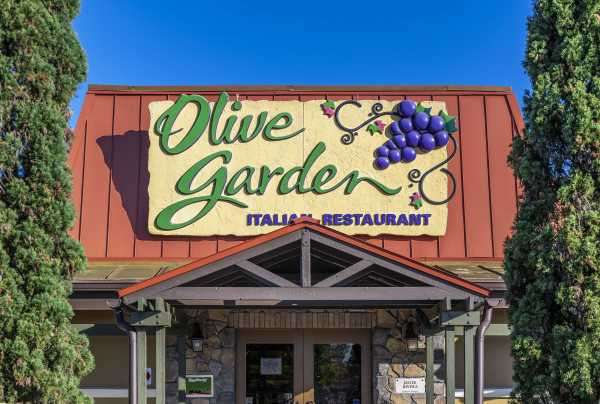
This story is part of a group of stories called

On the evening of January 8, as his dear friend President Donald Trump was being locked out of Twitter, Fox News host Sean Hannity ran a teaser for an unusual upcoming segment, promising to address a pressing problem about pasta.
In the clip, Hannity tells his audience to stay tuned for a discussion about “a blue check tweet” that claims he lost a “lifetime pasta card” from popular American chain restaurant Olive Garden. “We’ve looked into that, we’ll tell you what that’s about,” he assures them.
So have I. And, watching the segment, I found it wasn’t really about Olive Garden, or pasta, at all — but a convenient way to repackage old conservative attacks on social media companies, while skirting the difficult topics of Trump’s ban from social media, the insurrection that caused it, and Fox News’s role in both.
What was this “blue check tweet” about Sean Hannity losing a “pasta card”?
Following the insurrection at the Capitol on January 6, Louie Mantia Jr. — a designer from Portland, Oregon, who happens to be verified on Twitter — posted an image to Twitter with the caption “A statement from Olive Garden.”
It appeared to be a few paragraphs from the company condemning the violence, promising to seek out rioters, and revoking a number of Pasta Passes, including Hannity’s. (The Never Ending Pasta Pass being a pass that allowed the bearer unlimited pasta.)
To be clear, there is no reason to believe Hannity ever had Olive Garden’s infamous promotional privilege. The image was, as Mantia would explain, fake.
The viral post read:
On Friday at 4:51 pm ET, Mantia posted a thread explaining that the image was fiction, saying, “Just so I’m abundantly clear: it’s not a real statement.” You can read the full thread here; it’s very thoughtful and thorough.
The original image was also very thoughtful and thorough. It was, in fact, an absolutely flawless send-up — Freudian slip typo included, which Mantia says was accidental but is both typical of these posts and a real burn on the consistency of Olive Garden’s Alfredo sauce — of the kind of block-of-text statements that brands are frequently compelled to issue when national events happen.
I hate to explain the joke, but it was very, very well done, so much so that many people believed it was real — including, I’ll admit, me, briefly. I happened to be writing up an explainer about why brands are weighing in on what happened at Capitol and very nearly included it in the post. (There but for the grace of realizing when something’s too good to be true.)
Mantia’s image had all the hallmarks of one of these posts: It used the American chain restaurant’s logo and familiar colors (brown and olive green). It was just the right length — long enough that you feel compelled to skip over the substance, but too short to say anything meaningful. It included an action statement (canceling that “Lifetime Pasta Pass”) and a subtle reference to the coronavirus. It bolded the important words, including in-company proper nouns and slogans, had callouts for delivery, and the brand, government agency, and city the company had partnered with to catch and punish those who took part in the insurrection.
In his explanation of why he posted the image — and why he deleted it — Mantia mentioned the “absurd” need brands feel to tweet about national events, saying, “There is a very low bar for what companies and individuals feel like they need to make public statements about.” He pointed specifically to Axe addressing a can of its body spray pictured in the wreckage of Wednesday’s events.
Brands issue these statements commonly — both after they’re passingly implicated in an event and simply because of the magnitude of an event. The drive to issue such statements comes from a combination of consumer expectation, brand building, and the fact that capitalism is an integral American system, practically a fourth branch of government. As I explained previously, the statements are “a corporate reality that exists uncomfortably in between opportunity and obligation.” Beyond Axe, companies like Coca-Cola, Ben & Jerry’s, Chevron, and Patagonia have made statements about Wednesday’s mob action.
The joke was the absurdity of this reality. Explaining the absurdity, as Mantia did first and I am now, is indeed only more absurd.
Okay, it’s absurd, but why Olive Garden?
Olive Garden wasn’t a random choice. Mantia explained that the gag had been sparked by an exchange, of sorts, between cable news personalities Anderson Cooper and Sean Hannity. He writes:
Cooper’s invocation of those mass-appeal brands as places rioters would choose to retire after a day of rioting brought on accusations of classism. (Cooper is, after all, a member of the storied Vanderbilt family, which rose to prominence during the Gilded Age.) Hannity — also a wealthy man, whose net worth Forbes estimates at $43 million — capitalized on this, using his regular-guy, Fox News bona fides to embrace the chain and shame Cooper. Mantia, like many Americans glued to cable news and Twitter over the last week (or cable news via Twitter, in Mantia’s case, as he told me over Twitter DM), saw it all.
This cable news dustup combined with Axe’s statement (plus, he notes, “the fact that I have very little actual work to do these days”) pushed the Portland designer to create a response to the kerfuffle from Olive Garden and post it online, as one does. He explained in his thread that he worked to make it “an obvious joke” by, among other things, including the Cooper-related reference to the Holiday Inn.
But the irresistible typo of “viscous” instead of “vicious,” the hilarious and brand-appropriate renaming of Italian hospitality as “Hospitaliano” (which, indeed, is real), the fact that brands weigh in like this all the time, and the sheer volume of news to keep up with all combined to make the image go quickly viral and out of his control.
“People,” Mantia wrote, “thought Sean Hannity really lost his Pasta Pass (which, as we all know, has not been sold since 2019).”
Mantia was reflective in his tweets, saying, “People joke that social media managers have a rough time when something like this happens. I know that to be true, and I didn’t consider that aspect seriously enough. Nor did I consider that my verified badge on Twitter would lend credence to something as stupid as this.” Once the threat of the joke turning to misinformation became apparent, Mantia said, “I think it becomes not *just* a joke.”
Sean Hannity may have agreed; for him, it seemed to become an opportunity.
This all happened on Twitter, which was in the news for other reasons
At around 6 pm ET on January 8, about an hour after Mantia posted his statement and a few hours before Hannity’s live show aired on Fox News, Twitter permanently banned President Trump from Twitter.
Over the next few hours, Trump hopped from Twitter account to Twitter account, trying to threaten the tech company — and all tech companies — with Section 230, the free speech law that keeps tech companies from being liable for what third parties, i.e. users, post on their sites (for the most part, anyway). The ban became a huge story, despite Twitter’s best efforts; it was not news one could easily avoid.
Immediately, Trump allies from Sen. Lindsey Graham to the president’s son, Donald Trump Jr., accused Twitter of censorship and hypocrisy, noting that other world leaders who had endorsed repression and advocated for violence remained on the platform. Of course, this ignores the fact that, as a private platform, Twitter makes its own rules and can deplatform whoever it wants, whenever it wants. (This position also ignores the last however many years of GOP enthusiasm about the sacred autonomy of private companies.)
But over in the Fox studios, Sean Hannity found a personal angle to implicate Twitter in this hypocrisy: misinformation that had proliferated that very day about himself. And the Pasta Pass! This too, ultimately, is a gag.
Throwing the explanation of the affair to Joe Concha, Hannity said, “Now, today, the leader of the free world’s permanently suspended [from Twitter], and I read on that same site — that believes in truth! — that I lost my lifetime pasta membership to Olive Garden! Which is not true!”
Hannity calls the post “menacing” but appears to find the humor in it. After extolling the virtues of Olive Garden’s offerings, including the hard-to-argue-about hot doughnuts, he says, “I would never want to silence anyone beating the crap out of me; they actually make me laugh some days.” And indeed, Mantia’s tweet does not seem to be the force of Hannity’s ire; it’s more a jumping-off point for the segment.
Concha keeps up the laughs by adding that the restaurant gives you more breadsticks than one man can responsibly consume — before sidestepping Mantia’s joke post and moving on to examples of false tweets that are still up: Chinese “mouthpieces” claiming the US created the coronavirus, and tweets that would seem to violate Twitter’s rules from the accounts of both Louis Farrakhan and white nationalist Richard Spencer.
In highlighting these tweets, the point was made that of course, no one at Fox would suggest these figures lose their own Twitter privileges. Although they had the examples at the ready, and certainly seem to deplore them, this messaging allows Hannity and his network to misleadingly position themselves as defenders of free speech — while also defending Trump, and conveniently redirecting focus onto Twitter, rather than the incendiary statements Trump made on the platform, or all the ways Fox News reinforced them.
Reached for comment by Twitter DM, Mantia said, “Mostly, I’m astounded that Sean Hannity took any time to be upset about this fabricated issue. In one of the most news-dense weeks of the recent past, he spent a few minutes talking about how he didn’t have a pasta pass revoked. In my thread, I mention how absurd things are, which is why I created the Olive Garden PR statement to begin with. Watching Hannity last night spend any amount of time on me, a ‘blue check’ who posted a ‘menacing report’ that is ‘fake news’ was icing on the cake of absurdity.”
For Hannity, it seems, the Olive Garden tweet was a distraction, and a good one. Just as the host seized on Cooper’s tossed-off classism on previous shows, he filtered this latest news through a digestible, brand-friendly lens — one where he’s the victim, but he doesn’t even mind!
And it makes sense, because when it’s time to talk about how a major tech company permanently suspended the account of a friend and political figure you’ve spent four years boosting “due to the risk of further incitement of violence,” the best way to go is to keep it fun, and keep everyone talking about breadsticks.
vox-mark
Sign up for the
newsletter
The Goods
Email (required)
By signing up, you agree to our Privacy Notice and European users agree to the data transfer policy.
For more newsletters, check out our newsletters page.
Subscribe
Support Vox’s explanatory journalism
Every day at Vox, we aim to answer your most important questions and provide you, and our audience around the world, with information that empowers you through understanding. Vox’s work is reaching more people than ever, but our distinctive brand of explanatory journalism takes resources. Your financial contribution will not constitute a donation, but it will enable our staff to continue to offer free articles, videos, and podcasts to all who need them. Please consider making a contribution to Vox today, from as little as $3.
Sourse: vox.com





